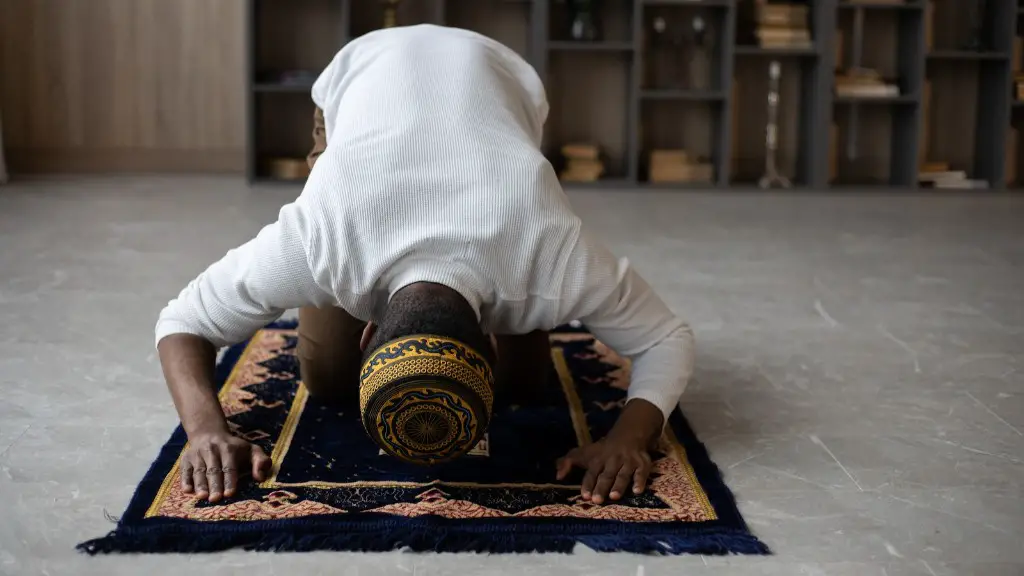What Is Restoration In Christianity
Restoration in Christianity is a theological concept that seeks to restore the life of saints and faithful believers to a state of being that was lost due to sin and transgression. It is a form of spiritual healing, which bridges the gap between God’s grace and man’s need for salvation. The concept of restoration can be illustrated by the Parable of the Lost Coin, told by Jesus in Luke 15:8-10. In this parable, a female seeks out something which was lost, and when she finds it, she rejoices in the restoration of it.
The Bible speaks of restoration in many ways, including being restored to fellowship with God, being reconciled to him, and being restored to peace and wholeness of life in his presence. Restoration in this sense involves the reconciliation of an individual with God, primarily on a spiritual plane. When an individual has been reconciled to God, restoration then allows for the individual to experience peacefulness and security in their life.
Restoration in Christianity does not simply involve the restoring of an individual to a relationship with God. It brings to the individual a greater understanding of the spiritual principles that were lost through sin, and a transformation of the individual’s life as a result of that understanding. For instance, an individual may be restored to peace in his or her life, allowing for a greater understanding of the true nature of God’s love and grace. This restoration process is a two-way process: upon being restored to God, the individual must also work on the effort of restoring himself to God.
Restoration is a process of repentance and spiritual transformation. It involves the individual owning up to his or her failings and committing to be loyal to God, obedient to his teachings, and open to his grace and truth. In this process of restoration, the individual moves away from the damaging choices of the past and towards a greater understanding of the truth of God.
There are various ways that Christians may invite God into their lives to experience restoration. Prayer is one of the primary ways through which individuals experience restoration in the Christian faith. Through prayer, the individual can open himself up to the work of the Holy Spirit, allowing for spiritual transformation and growth. Additionally, fellowship with other believing individuals allows for Christian discipleship, teaching, and learning, furthering the process of spiritual restoration.
Restoration can also be experienced through participating in various rituals such as confession, baptism, and Communion. In confessing to God one’s sins and transgressions, the individual can experience a profound sense of peace, knowing that they have been forgiven and restored to fellowship with God. Similarly, through baptism one can symbolically experience the death of their old self and life and the rebirth of a new self, a restored self living in communion with God. Lastly, through the taking of Communion, individuals participate in the breaking of bread and the sharing of the cup, signifying the presence of God in the believer’s life.
Reconciliation of Man and God
The reconciliation of man and God is a central theme in restoration in Christianity. As the Apostle Paul states in Romans 5:10, “For if, while we were enemies, we were reconciled to God by the death of his Son, much more, now that we are reconciled, shall we be saved by his life.” Reconciliation is a process of being restored to fellowship with God, and involves the individual accepting that they have sinned against God and in turn, accepting the grace and mercy of God. Restoring our lives and relationship with God involves recognizing the need to repent and turn away from our sinful past, in order to become open to the truth of God.
An integral part of the process of reconciliation is obedience to God’s Word and laws. Obedience is about being obedient to God, which begins with prayer and studying of the Bible. Ultimately, it involves accepting that we are not in charge of our own lives, but rather, God is. We are to depend on his will and his guidance, following a life of faith and humility, thereby allowing for spiritual transformation.
Reconciliation furthers the process of restoration by allowing for the individual to break away from the form of the old ways and to enter into the new ways of God’s Kingdom. It involves turning away from those aspects of life that stand in opposition to God’s will, and walking in the light of God’s truth, grace, and love. The key to true spiritual restoration and wholeness of life is to fully live in and experience the presence of God.
Restoring our relationship with God is not a one-time event, but rather it is a journey and process. Through prayer, study of Scripture, and participating in the sacramental and communal life of the Church, we can experience the joy of being in full fellowship with God and be transformed in his Spirit.
Developing Spiritual Transformation
The process of restoration in Christianity does not end with the reconciliation of man and God, but rather it includes a further development of spiritual transformation. This spiritual transformation brings about a life of peace and wholeness, in which the individual moves away from sin and likewise, into a life of obedience to God’s Word and laws. The transformational process includes a weakening of the hold of the old self, and a growth in the strength of the new self, the self that has been reborn through God and His Spirit.
In the life of spiritual transformation, the individual will experience a desire to continually pursue the things of God: obeying His commands, being faithful to His Word and teachings, and living in the light of His truth. Furthermore, the individual will strive to be disciplined, holy, and obedient as they seek after a life of service to God and the Church. In this process of spiritual transformation, the individual will develop the capacities to recognize and follow the will of God and to be an example of Christian living.
The process of spiritual transformation further involves a maturity in faith, which involves faith in the face of difficulty, pain, and fear. This spiritual maturity is not only based on intellect, but is evidenced in a life that reflects the attitudes and character of Jesus. It involves a life lived in love, purity, charity, and self-sacrifice. Through spiritual growth, comes a life of service to others, which is truly the pinnacle of Christian living.
The process of restoration in Christianity works in conjunction with spiritual transformation, allowing the individual to experience a life of spiritual wholeness, peace, and joy in the presence of God. Through prayer, fellowship with believing individuals, a renewed commitment to living in obedience to God, and spiritual growth, individuals can experience the restoration joy of living in God’s presence.
Application to Everyday Life
Restoration in Christianity is not merely a theological concept, but an idea that can be applied to everyday life. Through repentance, prayer, and study of Scripture, individuals can experience spiritual transformation and restoration in their life. This application is a continual journey, involving a continual deepening of the individual’s relationship with God. This can be illustrated through the example of the Parable of the Prodigal Son, which speaks of the son’s repentance and return to fellowship with his father.
Through the application of the process of restoration, individuals can experience a life of joy, peace, and love, in the presence of God. Through prayer and participating in the communal life of the Church, individuals can draw closer to God, allowing for the greater honest exchange of truth and knowledge. Additionally, through study of Scripture, individuals can gain an understanding of the true nature of God and His will, moving away from the brokenness of their lives, and into the fullness of that which God has planned for them.
Restoration in the Christian faith goes beyond the spiritual realm and is relevant to everyday living. Through living out the principles of the spiritual life, we can experience the joy of restored peace, joy, love, and fellowship in our life. We can experience the transformation of our lives, moving from darkness to light, from brokenness to restoration.
Commitment to Spiritual Growth
The theme of restoration in Christianity is also about loving, and it is about committing to spiritual growth. This commitment involves accepting the grace and mercy of God, and rejoicing in the blessings of spiritual transformation. This commitment ultimately involves opening ourselves up to God, allowing for the movement of His Spirit to draw us closer to the life that God has planned for us.
Restoring our relationship with God involves faith and trust. It involves having the courage to surrender our lives to Him, trusting in his promises of grace and renewal. We are to have faith that entering into a relationship with God will usher in a life of hope and freedom, rather than a life of bondage and sadness.
The beginning of restoring our relationship with God begins with repentance, but it does not end there. We are to actively seek out God through prayer and study, allowing for spiritual transformation and growth. We are to live a life of love and service, allowing for the presence of the Holy Spirit in our life.
Restoration in Christianity is ultimately about committing to spiritual renewal, allowing for spiritual transformation to take place. Through repentance, prayer, and obedience to God, individuals can experience a life of true joy and peace in the presence of God.
Experience of Prayer and Meditation
Restoration in Christianity is also linked to the experience of prayer and meditation. Prayer allows for the individual to open themselves up to the Spirit of God, allowing for divine healing of the wounds of their past. Additionally, through prayer, one can clear their minds and hearts of the burdens that might otherwise stand in the way of spiritual growth.
Similarly, meditation is a form of prayer that allows for the individual to focus their mind and thoughts on God. Through practices such as mindful meditation, individuals can cultivate greater awareness of God’s presence in their lives, allowing for spiritual transformation and growth. Meditation is a form of prayer that allows for the individual to commune with God in a deeper way, allowing for the individual to experience a deeper sense of peace in their life.
Prayer and meditation allow for the individual to enter into a deeper relationship with God, allowing for the purification of their minds and hearts. Through prayer and meditation, individuals can experience a sense of joy and peace, allowing for the individual to move away from the damaging thought patterns of the past and into a renewed relationship with God.
The experience of prayer and meditation allows for the individual to develop a deeper understanding of the truth of God and his will. It further allows for the individual to experience a sense of peace and joy in their life, as they open themselves to the movement of His Spirit.
Encountering Spiritual Freedom
The final experience of restoration in Christianity is the experience of spiritual freedom. As individuals continue on their journey of spiritual transformation, they come to experience a life of liberty and joy. Spiritual freedom is found in being

